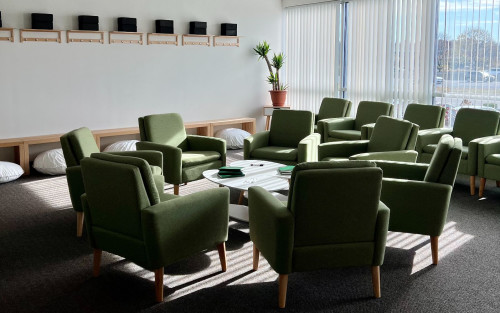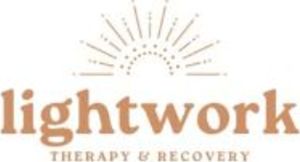






Lightwork Therapy & Recovery Woburn
Verified Center
This provider's information has been quality-checked by Recovery.com's Research Team for accuracy and completeness, including center verification through appropriate third-party organizations.
Treatment Focus
This center treats mental health conditions and co-occurring substance use. You receive collaborative, individualized treatment that addresses both issues for whole-person healing.
Primary Level of Care
Outpatient treatment offers flexible therapeutic and medical care without the need to stay overnight in a hospital or inpatient facility. Some centers offer intensive outpatient program (IOP), which falls between inpatient care and traditional outpatient service.
Treatment Focus
This center treats mental health conditions and co-occurring substance use. You receive collaborative, individualized treatment that addresses both issues for whole-person healing.
Primary Level of Care
Outpatient treatment offers flexible therapeutic and medical care without the need to stay overnight in a hospital or inpatient facility. Some centers offer intensive outpatient program (IOP), which falls between inpatient care and traditional outpatient service.
Provider's Policy
We work directly with most major insurance providers to verify your coverage and help you navigate the financial aspects of your treatment.
Lightwork Therapy & Recovery Woburn
Lightwork Therapy & Recovery Woburn
About Lightwork Therapy & Recovery Woburn
Founded in Woburn, Massachusetts, Lightwork Therapy & Recovery is a sanctuary dedicated to empowering women ages 18+ through mental healthcare. This center serves as a beacon of hope, offering a nurturing environment where women can address mental health challenges like anxiety, depression, trauma, PTSD, and eating disorders. With a blend of individual therapy, group sessions, and holistic wellness techniques, Lightwork Therapy & Recovery helps women uncover their inner resilience and build the confidence needed to navigate life's challenges. The center's mission is to support women on their journey toward healing and self-discovery, fostering a sense of community and empowerment throughout each step of the process.
Gender-Specific Treatment Approach
Lightwork Therapy & Recovery delivers gender-specific programs tailored to women's unique needs. The center creates an environment of safety and understanding by acknowledging the distinct psychological, emotional, and physiological challenges women face. The day treatment and outpatient programs focus on issues commonly encountered by women, such as trauma, body image concerns, and societal pressures. This targeted approach fosters empowerment and self-discovery, allowing for deep connections and shared experiences among clients.
Empowering Outpatient Care for Women
The center provides various levels of outpatient care, including a mental health day treatment program (PHP) and an outpatient program (OP), designed to accommodate each client's unique needs. These programs incorporate proven-effective therapies such as cognitive behavioral therapy (CBT), acceptance and commitment therapy (ACT), somatic therapy, and mindfulness techniques. This versatile, non-residential treatment approach allows clients to receive personalized care that supports their mental health journey while allowing them to maintain their daily responsibilities, making it an ideal choice for those seeking balance and healing.
Transformative, Community-Based Healing
At Lightwork Therapy & Recovery, a core value is to create a community of healing and empowerment. The center fosters a supportive environment where women can connect with others who share similar experiences, deepening their growth process. Through tailored therapy and a focus on women's roles and identity, clients are encouraged to explore their strengths and embrace personal growth. Clients can expect to find renewed hope and resilience through the center's nurturing atmosphere, making Lightwork Therapy & Recovery a dedicated place for healing and empowerment.
Highlights from the Center
Highlights
These highlights are provided by and paid for by the center.
Holistic Approach
Trauma-Informed Care
Women Only
Center Overview
Treatment Focus
This center treats mental health conditions and co-occurring substance use. You receive collaborative, individualized treatment that addresses both issues for whole-person healing.
Joint Commission Accredited
The Joint Commission accreditation is a voluntary, objective process that evaluates and accredits healthcare organizations (like treatment centers) based on performance standards designed to improve quality and safety for patients. To be accredited means the treatment center has been found to meet the Commission's standards for quality and safety in patient care.
Insurance Accepted
Cash Pay Rates
Estimated Cash Pay Rate
Center pricing can vary based on program and length of stay. Contact the center for more information. Recovery.com strives for price transparency so you can make an informed decision.
Meet Your Care Team

Jackie Lightner, LICSW
Executive Director

Molly Hoopes, LMHC
Clinical Director

Kelly Matthews
Clinical Outreach

Makayla Calouro
Clinical Coordinator

Danielle Harrison
Admissions Coordinator

Brett Barrier, LCSW
Mental Health Therapist

Alyssa Corrado
Mental Health Therapist

Kate Adamson, LCSW
Mental Health Therapist

Sami Sylvester
Mental Health Technician

Alexa Cahill
Mental Health Technician

Paige Symon
Mental Health Technician | Clinical Intern

Angie Nguyen
Mental Health Technician | Clinical Intern

Danielle Lavallee, MS, RD, LDN
Group Facilitator

Jenny Whyte, LMHC
Group Facilitator

Darien Santana, LMHC
Group Facilitator

Marie Freiselben, LMHC
Group Facilitator

Jill Manos, C-IYAT
Group Facilitator

Madison White, RN, BSN
Group Facilitator




Levels of Care







Your Care Options
Specializations
Anxiety
Anxiety is a common mental health condition that can include excessive worry, panic attacks, physical tension, and increased blood pressure.
Burnout
Burnout entails mental and physical exhaustion, and leads to a severe lack of fulfillment. This condition is often caused by overwork.
Depression
Symptoms of depression may include fatigue, a sense of numbness, and loss of interest in activities. This condition can range from mild to severe.
Holistic
A non-medicinal, wellness-focused approach that aims to align the mind, body, and spirit for deep and lasting healing.
Obsessive Compulsive Disorder (OCD)
OCD is characterized by intrusive and distressing thoughts that drive repetitive behaviors. This pattern disrupts daily life and relationships.
Outpatient
During outpatient rehab, patients attend a structured treatment program while continuing to live at home.
Trauma
Some traumatic events are so disturbing that they cause long-term mental health problems. Those ongoing issues can also be referred to as "trauma."
Women only
Women attend treatment in a gender-specific facility, with treatment delivered in a safe, nourishing, and supportive environment for greater comfort.
Who We Treat
Young Adults
Emerging adults ages 18-25 receive treatment catered to the unique challenges of early adulthood, like college, risky behaviors, and vocational struggles.
LGBTQ+
Addiction and mental illnesses in the LGBTQ+ community must be treated with an affirming, safe, and relevant approach, which many centers provide.
Midlife Adults
For adults ages 40+, treatment shifts to focus on the unique challenges, blocks, and risk factors of their age group, and unites peers in a similar community.
Pregnant Women
Addiction and mental health treatment meets the clinical and psychological needs of pregnant women, ensuring they receive optimal care in all areas.
Professionals
Busy, high-ranking professionals get the personalized treatment they need with greater accommodations for work, privacy, and outside communication.
Women only
Women attend treatment in a gender-specific facility, with treatment delivered in a safe, nourishing, and supportive environment for greater comfort.
Approaches
Evidence-Based
A combination of scientifically rooted therapies and treatments make up evidence-based care, defined by their measured and proven results.
Holistic
A non-medicinal, wellness-focused approach that aims to align the mind, body, and spirit for deep and lasting healing.
Gender-Specific
Separate treatment for men or women can create strong peer connections and remove barriers related to trauma, shame, and gender-specific nuances.
Therapies
1-on-1 Counseling
Patient and therapist meet 1-on-1 to work through difficult emotions and behavioral challenges in a personal, private setting.
Meditation & Mindfulness
A practiced state of mind that brings patients to the present. It allows them to become fully aware of themselves, their feelings, and the present moment.
Trauma-Specific Therapy
This form of talk therapy addresses any childhood trauma at the root of a patient's current diagnosis.
Online Therapy
Patients can connect with a therapist via videochat, messaging, email, or phone. Remote therapy makes treatment more accessible.
Mindfulness Therapy
This ancient practice can be mental, emotional, and even spiritual. In meditation, you focus your attention on the present moment without judgement.
Aromatherapy
Inhaling or topically applying essential oils can help relieve stress, soothe pains, and relieve emotional distress.
Art Therapy
Visual art invites patients to examine the emotions within their work, focusing on the process of creativity and its gentle therapeutic power.
Body Image Therapy
Therapists use cognitive behavior techniques to challenge how patients perceive their body and their worth, rewriting negative thoughts and attitudes.
Conditions We Treat
Grief and Loss
Grief is a natural reaction to loss, but severe grief can interfere with your ability to function. You can get treatment for this condition.
ADHD, ADD
ADHD is a common mental health condition caused by dopamine imbalance. Common symptoms include inattention, hyperactivitiy, and impulsivity.
Anxiety
Anxiety is a common mental health condition that can include excessive worry, panic attacks, physical tension, and increased blood pressure.
Bipolar
This mental health condition is characterized by extreme mood swings between depression, mania, and remission.
Burnout
Burnout entails mental and physical exhaustion, and leads to a severe lack of fulfillment. This condition is often caused by overwork.
Codependency
Codependency is a pattern of emotional dependence and controlling behavior. It's most common among people with addicted loved ones.
Depression
Symptoms of depression may include fatigue, a sense of numbness, and loss of interest in activities. This condition can range from mild to severe.
Eating Disorders
An eating disorder is a long-term pattern of unhealthy behavior relating to food. Most people with eating disorders have a distorted self-image.
Substances We Treat
Co-Occurring Disorders
A person with multiple mental health diagnoses, such as addiction and depression, has co-occurring disorders also called dual diagnosis.
Languages
Aftercare
Care Designed for Your Needs
Amenities
Special Considerations
Gender-specific groups
Patients in gender-specific groups gain the opportunity to discuss challenges unique to their gender in a comfortable, safe setting conducive to healing.
Activities
Yoga
Yoga is both a physical and spiritual practice. It includes a flow of movement, breathing techniques, and meditation.






